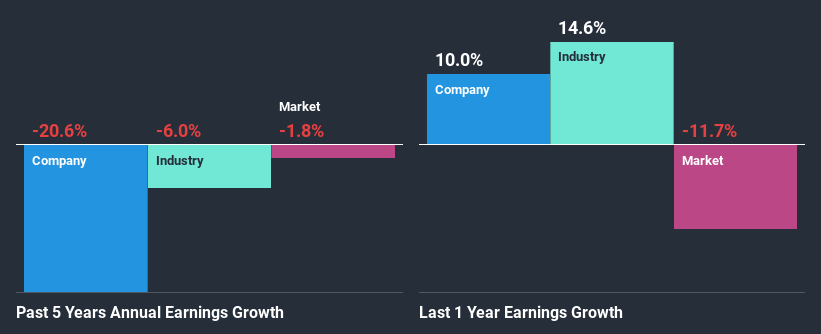Is Oriental Food Industries Holdings Berhad's (KLSE:OFI) Recent Price Movement Underpinned By Its Weak Fundamentals?

With its stock down 3.4% over the past three months, it is easy to disregard Oriental Food Industries Holdings Berhad (KLSE:OFI). It seems that the market might have completely ignored the positive aspects of the company's fundamentals and decided to weigh-in more on the negative aspects. Fundamentals usually dictate market outcomes so it makes sense to study the company's financials. Particularly, we will be paying attention to Oriental Food Industries Holdings Berhad's ROE today.
ROE or return on equity is a useful tool to assess how effectively a company can generate returns on the investment it received from its shareholders. In other words, it is a profitability ratio which measures the rate of return on the capital provided by the company's shareholders.
View our latest analysis for Oriental Food Industries Holdings Berhad
How To Calculate Return On Equity?
The formula for ROE is:
Return on Equity = Net Profit (from continuing operations) ÷ Shareholders' Equity
So, based on the above formula, the ROE for Oriental Food Industries Holdings Berhad is:
6.7% = RM13m ÷ RM200m (Based on the trailing twelve months to September 2020).
The 'return' refers to a company's earnings over the last year. So, this means that for every MYR1 of its shareholder's investments, the company generates a profit of MYR0.07.
What Is The Relationship Between ROE And Earnings Growth?
We have already established that ROE serves as an efficient profit-generating gauge for a company's future earnings. Based on how much of its profits the company chooses to reinvest or "retain", we are then able to evaluate a company's future ability to generate profits. Generally speaking, other things being equal, firms with a high return on equity and profit retention, have a higher growth rate than firms that don’t share these attributes.
Oriental Food Industries Holdings Berhad's Earnings Growth And 6.7% ROE
When you first look at it, Oriental Food Industries Holdings Berhad's ROE doesn't look that attractive. Yet, a closer study shows that the company's ROE is similar to the industry average of 6.9%. But Oriental Food Industries Holdings Berhad saw a five year net income decline of 21% over the past five years. Remember, the company's ROE is a bit low to begin with. So that's what might be causing earnings growth to shrink.
Next, when we compared with the industry, which has shrunk its earnings at a rate of 6.0% in the same period, we still found Oriental Food Industries Holdings Berhad's performance to be quite bleak, because the company has been shrinking its earnings faster than the industry.

Earnings growth is a huge factor in stock valuation. It’s important for an investor to know whether the market has priced in the company's expected earnings growth (or decline). By doing so, they will have an idea if the stock is headed into clear blue waters or if swampy waters await. If you're wondering about Oriental Food Industries Holdings Berhad's's valuation, check out this gauge of its price-to-earnings ratio, as compared to its industry.
Is Oriental Food Industries Holdings Berhad Efficiently Re-investing Its Profits?
In spite of a normal three-year median payout ratio of 37% (that is, a retention ratio of 63%), the fact that Oriental Food Industries Holdings Berhad's earnings have shrunk is quite puzzling. It looks like there might be some other reasons to explain the lack in that respect. For example, the business could be in decline.
In addition, Oriental Food Industries Holdings Berhad has been paying dividends over a period of at least ten years suggesting that keeping up dividend payments is way more important to the management even if it comes at the cost of business growth.
Conclusion
On the whole, we feel that the performance shown by Oriental Food Industries Holdings Berhad can be open to many interpretations. Even though it appears to be retaining most of its profits, given the low ROE, investors may not be benefitting from all that reinvestment after all. The low earnings growth suggests our theory correct. Wrapping up, we would proceed with caution with this company and one way of doing that would be to look at the risk profile of the business. Our risks dashboard would have the 3 risks we have identified for Oriental Food Industries Holdings Berhad.
If you’re looking to trade Oriental Food Industries Holdings Berhad, open an account with the lowest-cost* platform trusted by professionals, Interactive Brokers. Their clients from over 200 countries and territories trade stocks, options, futures, forex, bonds and funds worldwide from a single integrated account. Promoted
New: AI Stock Screener & Alerts
Our new AI Stock Screener scans the market every day to uncover opportunities.
• Dividend Powerhouses (3%+ Yield)
• Undervalued Small Caps with Insider Buying
• High growth Tech and AI Companies
Or build your own from over 50 metrics.
This article by Simply Wall St is general in nature. It does not constitute a recommendation to buy or sell any stock, and does not take account of your objectives, or your financial situation. We aim to bring you long-term focused analysis driven by fundamental data. Note that our analysis may not factor in the latest price-sensitive company announcements or qualitative material. Simply Wall St has no position in any stocks mentioned.
*Interactive Brokers Rated Lowest Cost Broker by StockBrokers.com Annual Online Review 2020
Have feedback on this article? Concerned about the content? Get in touch with us directly. Alternatively, email editorial-team (at) simplywallst.com.
About KLSE:OFI
Oriental Food Industries Holdings Berhad
An investment holding company, engages in the manufacture, marketing, and sale of snack food and confectionery products in Malaysia, rest of Asia, and internationally.
Flawless balance sheet and fair value.
Market Insights
Community Narratives



